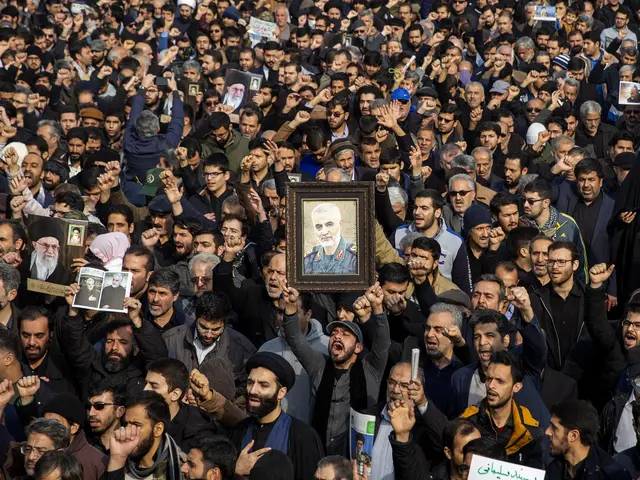Turkey, a neighbor of Iran, fears escalation of tensions following the U.S. airstrike that killed Iranian top commander Qassem Soleimani in Iraq, a scenario that would destabilize the entire Middle East and beyond.
Turkish President Recep Tayyip Erdogan chaired an emergency security meeting on Friday evening in Istanbul, hours after the killing of the senior commander of Iran's Islamic Revolution Guards Corps (IRGC) in Baghdad.
Without openly denouncing the attack, the Turkish Foreign Ministry said in a statement that "Turkey is gravely concerned over escalating tensions in the region between the U.S. and Iran."
"It is obvious that the U.S. airstrike targeting the convoy of Qassem Soleimani early on Friday will escalate mistrust and instability in the region," the statement added.
NATO member Turkey has adopted a neutral policy in the decades-long conflict between Washington and Tehran, not favoring its NATO ally to its eastern neighbor, with whom it has maintained friendly ties and growing economic cooperation despite U.S. and international sanctions.
However, Ankara was increasingly concerned and irritated over Iran's military and political interventions in regional conflicts such as Yemen war and especially in Syria, where the neighbors are supporting rival camps in the conflict.
Tehran is a supporter of the Syrian government while Ankara has, since the beginning of the civil war in 2011, called on Syrian President Bashar al-Assad to leave the power and launched three cross-border military operations in northern Syria since 2016, building bases on Syrian soil.
Yet Iran and Turkey, alongside Russia, are also engaged in the Astana process aiming to find a political solution to the civil war in Syria.
"Iranian influence in Iraq has reached a more troublesome stage than the American occupation itself does," wrote Yasin Aktay, an aide to Turkish president, in a column published on Yeni Safak Daily, blaming Shiite sectarianism for the unrest in Iraq.
Aktay described Soleimani as "Iran's biggest Trump card in the Middle Eastern chess game, where he (Soleimani) was in charge of masterminding, organizing and carrying out Iran's operations in Syria, Lebanon, Iraq and Yemen."
After the shocking assassination, Turkish analysts think that Turkey has made it clear that it is determined to remain neutral in the volatile region, warning that an escalation would engulf all nations of the region, without any exceptions.
"For the moment, no one knows how this crisis will evolve. But could Turkey maintain its neutrality if things go from bad to worse? It is very difficult to say," Selcuk Colakoglu, head of the Ankara-based think tank Center for Asia-Pacific Studies, told Xinhua.
"For the moment being, this crisis does not involve Turkey, but if it is forced to choose a side over the other (Iran or U.S.), Turkey would face grave military and economic risks, so it is a real conundrum for Turkey," he said.
Turkish stocks fell and state-run banks reportedly intervened to prop up the Turkish lira after the killing of the Iranian general. The main BIST-100 index of shares dropped by 1.9 percent at the close of trading in Istanbul.
The lira lost 0.3 percent to 5.97 per dollar, continuing to stay at the lowest levels since May. State-run banks sold between 1 billion U.S. dollars and 1.5 billion U.S. dollars to stem the currency's decline in Turkey which is in a fragile economic recovery from a currency crisis erupted in August 2018.
"Putting aside the military and political dimensions of the affair, what would Turkey do if the U.S. decides to impose sanctions on all oil and natural gas imports from Iran? That would have a very negative impact on Turkey," which is a major gas importer of Iran, said former ambassador Uluc Ozulker.
Nevertheless, there could also be a benefit for Turkey in this volatile atmosphere, as Washington may want to restore the poor relations and mutual mistrust with Ankara stemming from the Syrian crisis and other differences, in a bid to counterweight on Tehran, experts argued.
Colakoglu commented that the U.S. administration could "postpone" current and planned sanctions on Turkey for its purchase of Russian S-400 defense systems, and may review its decision to exclude Ankara from the F-35 stealth warplane program.
"Currently, the mood prevailing in Washington is rather to punish Turkey for its deeds, but this could change in light of recent events with Trump and the Congress putting weight on the idea of improving relations with Ankara," added the expert.
(CGTN)
 简体中文
简体中文

